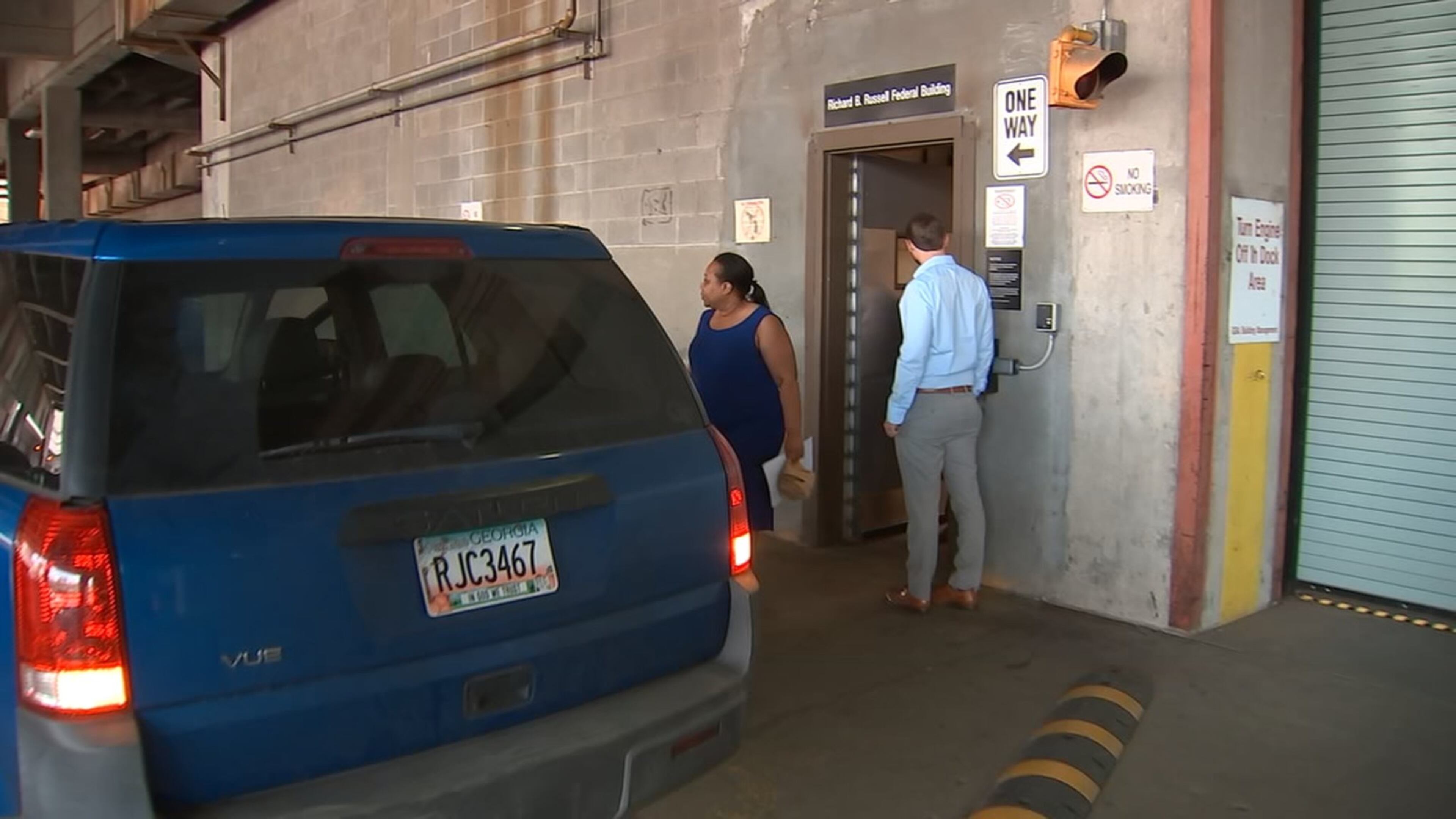Does official’s arrest mark the end of corruption in DeKalb County?
The arrest of DeKalb County Commissioner Sharon Barnes Sutton last week served as a reminder of a recent dark period in the county's history when numerous public officials were accused of theft, fraud and mismanagement.
County leaders say they have worked hard to restore public trust and to move DeKalb forward after years of investigations and arrests that one grand jury said exposed a “culture of corruption.”
Even the most optimistic official or resident can't say whether that period has truly come to an end. Sutton's arrest on charges of bribery and extortion involve actions that date back to 2014, and the FBI will not say whether others are under investigation.

However, CEO Michael Thurmond and members of the county commission say they are focused on improving government functions and operating transparently in hopes of proving to DeKalb’s 750,000 residents that a new day is here.
They point to a balanced budget and a growing rainy day fund. In addition to increased services, like road repaving through SPLOST revenue, they’ve erased the backlog of people disputing unusually high water bills. Officials also say they’ve increased spending on water and sewer system repairs.
Thumond says those actions are proof that DeKalb is on the right track.
He ran for office in 2016 after being recruited by people who said his leadership was needed in DeKalb. Although there have been challenges, Thurmond has been widely praised. Recent audits have found no evidence of wrongdoing under his watch.
“When people think about trust, they don’t just think about a bribe,” Thurmond said last week. “It’s much, much larger than that when you’re running a government of this size and magnitude. Will you fulfill your promises to the people?”
Still, DeKalb officials say the cloud of public mistrust hangs over their heads.
Lorraine Cochran-Johnson is the newest member of the county commission. Last summer she unseated an incumbent who was accused of sexual harassment. She said she is very thoughtful about taking steps to avoid even the appearance of potential corruption.
“It’s very important when you operate to do it with integrity,” she said. “Bringing people into the office so there is a documented record of conversations and actions that take place. Those are all very crucial as it relates to restoring transparency and ensuring there is never any ethical question of your activity.”
History of corruption
Voters in 2016 replaced Sutton with Steve Bradshaw, who campaigned on a theme of cleaning up government. At the time, Sutton's spending of public dollars was in question and citizens filed ethic complaints.
Bradshaw said it is frustrating for officials when someone like Sutton,who has been out of office for years, brings negative attention to DeKalb. But he also knows the county cannot pretend it never had issues with corruption.
“All any of us can do is work hard at our jobs, day in and day out,” Bradshaw said. “And let the voters decide if they see a change or not, if they feel a change, if they sense a change.”

It wasn’t just DeKalb County commissioners who faced accusations of corruption over the years.
Former CEO Burrell Ellis was found guilty in 2015 of lying to a grand jury about whether he asked county vendors to make donations to his campaign. He served an eight-month prison sentence, but his conviction was later overturned because the Georgia Supreme Court said he did not get a fair trial.
Lee May, who served as interim CEO after Ellis was suspended from office, was never charged with any crime but one incident involving a forged check and $4,000 in unaccounted funds remained a dark cloud over the latter part of his political career. And State Rep. Vernon Jones (D-Lithonia), who served as CEO from 2001 to 2009, faced accusations of bid-rigging and accepting kickbacks but was never charged.
Faye Coffield is a former police sergeant and Lithonia resident who speaks often about mismanagement at the top in DeKalb.
Part of the problem, Coffield said, is that arrests of government officials receive the attention but vendors who dole out bribes make deals and stay out of the headlines. Not until there is more accountability will public officials start resisting the temptation to act inappropriately, she said.
“We need to start being very strong on anti-corruption, and that means that all parties involved will be charged and treated the same way,” Coffield said. “In other words, when Barnes Sutton did the perp walk, whoever gave her that money should have been doing the perp walk right next to her.”
That sentiment is echoed by other residents who said they are cautiously hopeful that corruption is in DeKalb’s past.
Stephen Binney, who lives in Clarkston, said current DeKalb officials have better working relationships now and the government seems to be running smother. But he wishes they spent more time dissecting the problems of the past to ensure they aren’t repeated.
“I believe that Mr. Thurmond is more interested in looking good than he is in doing good,” Binney said. “I don’t think he does much harm, but I would like to see some of the old problems brought out and some solutions actually proposed. And it seems like what they want to do now is just sort of say, ‘it didn’t happen on my watch and so it doesn’t exist anymore.’ ”

Contracts and bribes
There were allegations and warnings for years before federal agents showed up to Sutton’s home to arrest her. Investigators hired by the county questioned thousands of dollars in spending in Sutton’s office. Concerned citizens filed an ethics complaint accusing Sutton of using county employees to staff a political event during their working hours and paying her personal attorney with public dollars.
Commissioner Kathie Gannon served alongside Sutton and said she tried unsuccessfully to strengthen oversight of commissioners, first by implementing new ethics guidelines and later asking auditors to monitor purchases. None of it stuck.
“She was going over-budget; we knew that she was paying her consultant-slash-boyfriend for things that had no work product,” Gannon said. “We knew that she used her discretionary funds to furnish a home office for herself. We just knew all kinds of things that were reported to the rest of the commission. We were in charge, but nobody cared.”
The board at the time was often divided along geographical and racial lines, which lead to acrimony and then distrust. At one point, Gannon, who is white, was removed from serving on any committees.
Five commissioners — Sutton, Larry Johnson, Stan Watson, Elaine Boyer and Lee May — often voted as a bloc. All but Boyer are black.
Johnson, who like Gannon and Jeff Rader remain on the commission today, said he remembers being torn between factions who lobbed accusations at each other with little proof.
“There was a lot of animosity on the board at the time,” he said recently.
All the battles and squabbles meant there was little oversight.
Like Sutton, Boyer and Watson faced criminal charges stemming from actions they took while on the commission. Watson pleaded guilty in 2017 to accepting $3,000 in county funds for government-sponsored trips he never took.
Boyer served a yearlong sentence after being convicted of fraud in 2014. She had paid an evangelist $83,000 in county funds as part of a kickback scheme that allowed her to pocket most of that money.
Johnson said he doesn’t think that more oversight from fellow board members would have solved those issues because there was so much dysfunction in county government at the time. Important projects, like the sewage system cleanups required under a federal consent decree with regulators, were behind schedule. There was plenty of blame to go around, he said.
The scheme Sutton is accused of concocting involves a relatively small amount of money: $1,000.
The indictment said that in 2014 she received two $500 payments — one at a restaurant and one at her home — from a subcontractor doing work in DeKalb on a project that appears to be the Snapfinger Creek Advanced Wastewater Treatment Facility.
Sutton pleaded not guilty to the bribery and extortion charges last week, and her attorney said she has done nothing wrong.
“Miss Sutton has been a long-standing commissioner, has an unblemished record and has worked hard for DeKalb County,” attorney Bret Williams said after his client was arraigned.

Sutton served as chairwoman of the Finance, Audit and Budget Committee, the committee that all high-dollar contracts had to pass through before going to the full seven-member commission for a final vote. As a result, she had the power to slow down projects or fast pace them.
DeKalb commissioners in 2013 approved a four-year deal with Tetra Tech, although the county had the power to cancel it early. Sutton made the motion to approve the contract, and a subcontractor named Environmental Consortium stood to make $1.8 million in the deal.
Viola Davis currently serves in the General Assembly, but back then she was a government watchdog who questioned Sutton's actions in office. She was saddened by the details in the indictment and news of Sutton's arrest.
“It showed that DeKalb County still has work to do,” Davis said. “And in the end, it hurts the image of our county. Now, we have cleaned up quite a bit of the corruption image that has been out there. But we still have work to do.
Gannon said the indictment proves that those tried to hold Sutton accountable years ago were on to something, even if they didn’t know what it was.
“Where there is smoke there is fire,” she said. “We had a lot of smoke. But it took the feds to put it all together and find the fire.”


